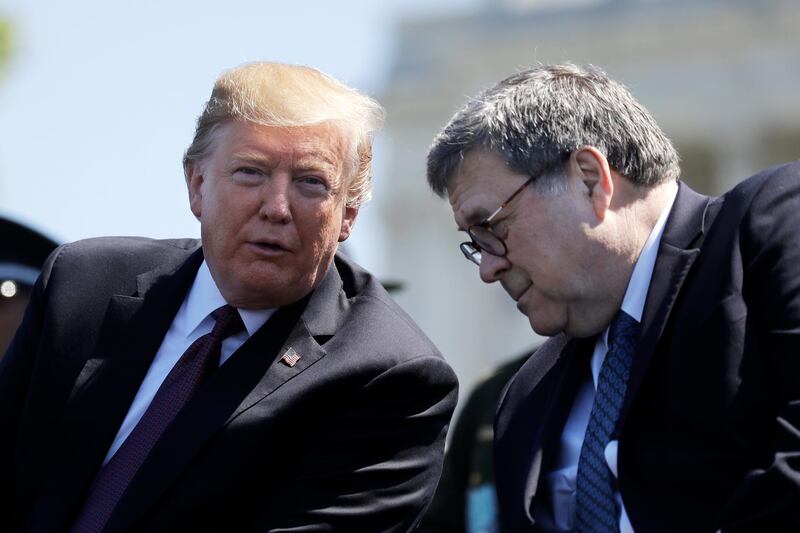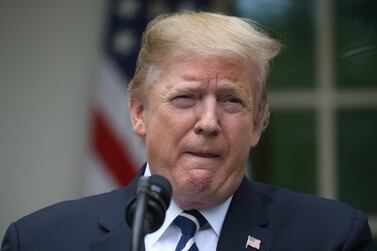President Donald Trump has directed the US intelligence community to "quickly and fully co-operate" with Attorney General William Barr's investigation into the origins of the multi-year probe of whether his 2016 campaign colluded with Russia.
The move marked an escalation in Mr Trump's efforts to "investigate the investigators" as he continues to try to undermine the findings of special counsel Robert Mueller's probe amid mounting Democratic calls to bring impeachment proceedings against the president.
Press secretary Sarah Sanders said in a statement on Thursday that Mr Trump was delegating to Mr Barr the "full and complete authority" to declassify documents relating to the probe, which would ease his efforts to review the sensitive intelligence underpinnings of the investigation. Such a move could create fresh tensions within the FBI and other intelligence agencies, which have historically resisted such demands.
Mr Barr has already asked John Durham, the US attorney in Connecticut, to examine the origins of the Russia investigation to determine whether intelligence and surveillance methods used during the probe were lawful and appropriate. Still, Mr Barr has been directly involved, according to a person familiar with the matter, and is also working with CIA Director Gina Haspel, Director of National Intelligence Dan Coats and FBI Director Christopher Wray.
Mr Trump has frequently claimed his campaign was the victim of "spying", but the intelligence community has insisted it acted lawfully in following leads in the Russia investigation and conducted surveillance under court order.
Mr Wray strongly opposed the release by Congress last year of details from a secret surveillance warrant obtained by the FBI on a former Trump campaign adviser, Carter Page. The White House had encouraged Republicans on the House intelligence committee to disclose that classified information, believing it could help undermine the Russia investigation.
Mr Wray, although co-operating with Mr Barr in a review of the origins of the Russia probe, would presumably baulk at declassifying information that could reveal sensitive sources or methods of investigators.
Despite Mr Mueller finding no evidence to support criminal charges against Americans related to Russia's actions, his report documented extensive Russian efforts to interfere in the 2016 campaign and willingness on the part of some in Mr Trump's orbit to accept their aid.
Thursday's move further solidifies Mr Barr's position in Mr Trump's eyes as a legal warrior fighting on his behalf.
After Mr Mueller submitted his report to Mr Barr in March, the attorney general released a four-page summary to Congress. Mr Barr's letter framed the debate about the probe over the next few weeks and, White House officials believe, allowed Mr Trump to declare victory before the release of the full report, the contents of which are far more ambiguous.
Mr Trump also appreciated Mr Barr's combative stance with legislators and reporters as he defended the Justice Department's handling of the report, and again when he declined to appear before Congress and defied a subpoena, drawing a possible contempt charge. Mr Trump has told close confidants that he "finally" had "my attorney general", according to two Republicans close to the White House.
"Today's action will help ensure that all Americans learn the truth about the events that occurred, and the actions that were taken, during the last presidential election and will restore confidence in our public institutions," Ms Sanders said.







